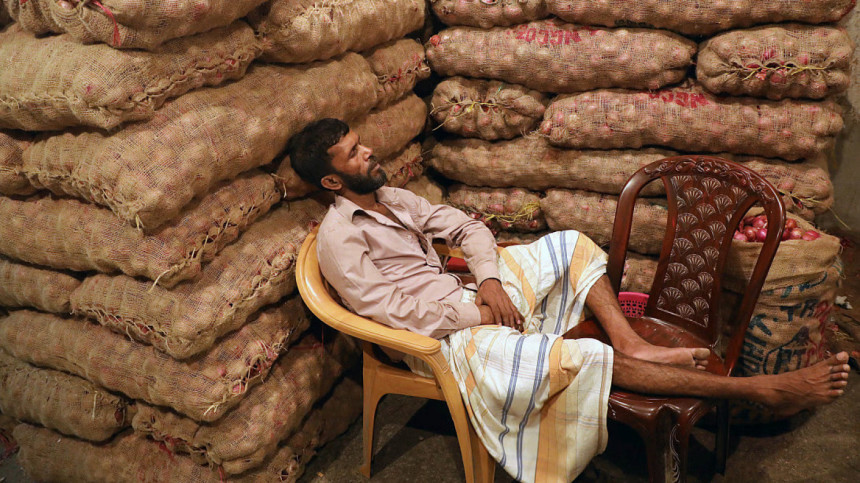Bangladesh is no stranger to national student movements and violent transitions. A peaceful transfer of state power has eluded this country for much of its 53-year existence. But it was for the first time that a student movement toppled an apparently powerful government. Political analysts around the world will now have to sift through their books to ascertain the theoretical underpinnings that best fit the latest transformative developments. Suffice it to say that the end of a long-running progressively authoritarian regime was inevitable, albeit unpredictable. The nagging question was when… and how?
Since early July, Bangladesh has gone through what can aptly be called a youth-driven mass uprising that toppled a regime that had lost touch with the people. But, for such a movement to change a regime that appeared fully ensconced in the saddle of government, there has to be some lethal and explosive spark that removes the ground from underneath the holders of state power. I am no political scientist, but I would like to argue that in a situation where one political party and its cronies share much of the wealth creation that has indeed happened over the past decade and a half, then it is the exclusion of the vast swath of the population (an overwhelming majority), not connected with the ruling elites or their henchmen, that presents a classic case for a political explosion to unravel.
It is true that, as a consequence of the Covid pandemic and subsequent Russo-Ukraine war, the economy was treading a rough terrain, putting a damper on the notion of a fairytale economy of Bangladesh. To make matters worse, there was an inexcusable mishandling of the internal and external challenges afflicting the economy that triggered something of an “economic tinderbox,” a concoction of Lutfey Siddiqi, a talented professor of Bangladeshi origin at London School of Economics (LSE). Was there an “economic tinderbox?” The answer, in my view, is yes and no. To be objective, one needs to take a closer look.
Most certainly, inflation, a rise in the general price level, remains a ticking time bomb. Ordinary citizens are suffering from serious diminution of their purchasing power from double-digit inflation that has stubbornly persisted for over 18 months. If not handled deftly and fast, it could be the cause of another implosion in the future. It is therefore reassuring to see the appointment of a highly competent professional economist like Dr Ahsan Mansur (former IMF Division Chief and Executive Director, PRI) at the helm of Bangladesh Bank. His immediate task is to bring inflation under control and restore sanity in the financial sector. But the challenges should not be underestimated.
Orthodox monetary management, which is now in full swing and seems to be intensified (by raising interest rates a few notches) may take too long for the patience of ordinary citizens to last. This inflation is not just an excess demand phenomenon which can be quashed by restraining demand through monetary tightening. There is a significant cost-push element arising from exchange rate depreciation (raising import prices) and hike in domestic energy tariffs that triggered the first inflationary spike in domestic prices in 2022. Then, there is the need to give a deflationary shock to prices, particularly to essential food items such as sugar, edible oils, onions, wheat, spices, etc. Import prices of intermediate and capital goods also need a reprieve in order to reduce production costs that have risen as a consequence of the 36 percent exchange rate depreciation that occurred over the past 18 months or more. What are the options?
Bangladesh presents a unique case of possible inflation control via long-pending tariff rationalisation in a high tariff economy. This presents an opportunity to kill two birds with one stone. What is not known to most experts in the country is that the 36 percent exchange rate depreciation has raised already high tariffs by exactly 36 percent, across-the-board. It is high time to shave off at least half of that, an action that will provide the dis-inflationary trigger to domestic prices.
Another point to note is that even if inflation were to decline to 6-7 percent due to monetary contraction, from the current level of more than 11 percent, over the next 6-9 months, that will not bring down market prices from current levels. This is the reality. You can’t reduce prices by imposing pricing caps either. So, it is critical to come up with every possible ammunition in the economic policy package to reduce market prices to tolerable levels. The tariff handle is one such instrument. Tariff rationalisation has been a long-pending agenda. Its time has come. The National Tariff Policy 2023 has all the right policies waiting to be implemented. Budget and balance of payments support from IMF-WB could assuage any adverse impacts on revenue or balance of payments.
Bottom line: inflation must be tamed in the shortest possible time, or else it will remain a keg in the economic tinderbox.
Next off, it is the massive misgovernance in the banking and financial sector that needs immediate attention and redress. Needless to give details, all of which are now in the open. Some of the big guns involved in mega-theft (no better word to describe what has happened) of banks are in custody or on the run. The malaise runs deep and is a signature outcome of crass cronyism of the worse kind. What a mockery of the banking supervision rules. Setting up a banking commission and publishing a white paper on the state of the financial sector is a high priority and acknowledged by the interim government. Governance reforms in this sector simply cannot wait. Given the depth of the malaise, it is a tall order but one that deserves not words but action. Or else, here is one more keg in the tinderbox that could lead to a meltdown of the overall economy, simultaneously bringing both political and economic distress.
Since the outbreak of the Russo-Ukraine war the economy has been reeling under a balance of payments shock out of which it is yet to recover fully. Mismanagement of foreign exchange reserves and mishandling of exchange rate policy led to sharp depletion of forex reserves that were in highly comfortable range until 2022. After inexplicable delays, the exchange rate was substantially depreciated. A flexible exchange rate policy has been adopted—a crawling peg system—which has had the intended impact of stabilising forex reserves while minimising the divergence between the bank rate and the kerb market rate, thus incentivising and redirecting remittances through official channels.
Now comes the hard part. Restoring forex reserves to comfortable levels exceeding 5-6 months of import cover will need robust export performance for which a competitive exchange rate will play its part. This is where the interim government needs to exude signals of stability to the world community with laser-focus on reforms that bring dynamism to our export-oriented economy. That will then attract rising amounts of export-seeking foreign direct investment (FDI) bringing capital and technology and creating jobs with upskilling of workers aimed at markets of the future.
Thankfully, the nation can reap enormous dividends from the leadership that Nobel laureate economist Dr Muhammad Yunus brings to the table. Having received messages of continuing support from the multilateral institutions like the UN, World Bank, and IMF, there is increasing prospect of receiving higher balance of payments and budget support to backstop much needed reforms in financial, trade, and tax systems. Though not perfect, Bangladesh presents a notable example of effective aid utilisation where official development assistance has been a catalyst for its rapid progress.
To conclude, despite the youth-driven upheaval, the key drivers of the economy remain very much intact and ready to take the economy to new heights. First, the readymade garment industry has by and large remained unscathed with export prospects unaltered and perhaps better in the coming year as China+1 geoeconomics, a global strategy of diversifying supply chains, takes deeper root. Second, remittances are already showing signs of resurgence to be commensurate with the fact that departure of migrant workers has doubled in recent years. Third, agriculture, a sector that has taken the country towards food self-sufficiency, is also transforming itself into a mechanised and viable commercial enterprise of the future. Fourth, NGO-GO partnership for health, education, and human services for which Bangladesh is recognised the world over, gets a new boost with an NGO pioneer at the helm of affairs. These key drivers present challenges, with occasional hiccups, but no tinderbox-like phenomenon.
No doubt, there was a pent-up demand in the country for regime change. The youth have delivered where politicians failed. If this event can be called a “second independence”, the nation indeed gets another chance to firmly establish itself as a “success story of development” that Oxford University professor and leading development economist, Stefan Dercon, thinks it is.
Dr Zaidi Sattar is chairman of Policy Research Institute of Bangladesh (PRI).
https://www.thedailystar.net/opinion/views/news/fall-titan-looking-the-economic-tinderbox-3691476







